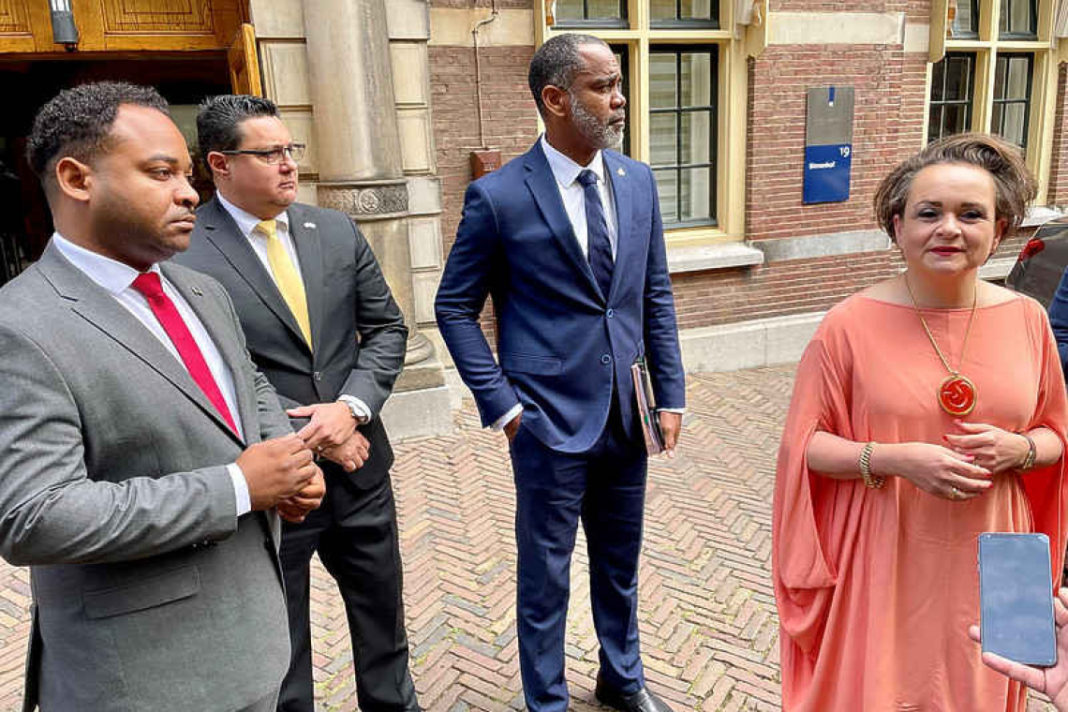Dutch State Secretary of Kingdom Relations and Digitisation Alexandra van Huffelen speaks with the media after Friday’s RMR with next to her Ministers Plenipotentiary Carlton Manuel of Curaçao (left), Guillfred Besaril of Aruba (second from left) and Rene Violenus of St. Maarten. (Suzanne Koelega photo)
THE HAGUE–The Kingdom Council of Ministers RMR on Friday decided that Aruba can start with the reversing of the 12.6% labour benefits reduction for its (semi) government employees.
No permission was granted for Curaçao and St. Maarten to start removing the 12.5% that is being deduced from the labour benefits package of their civil servants and workers in the semi-public sector. The two countries are still in discussion with the Dutch government about the conditions.
“Aruba has complied with the conditions, so they can start. Curaçao and St. Maarten haven’t, so they have to wait until they have met the conditions,” said Dutch State Secretary of Kingdom Relations and Digitisation Alexandra van Huffelen after Friday’s RMR. Aruba will start repaying 5% of the 12.6% to its workers per next month and increase the pay-back percentage in the months thereafter.
Van Huffelen, who met with the three Dutch Caribbean countries in Aruba last Sunday and Monday, said she was content that Aruba could now take the first step. “Everyone sees that the cost of living has been rising a lot. It is only logical that we look at phasing out the salary reduction. It is good to see that Aruba sees the possibilities to do this,” she stated.
The Dutch government has tied four conditions to reverse the labour benefits cut, Van Huffelen clarified. The countries must implement the law to curb the income of top earners in government and government entities. The countries must cover the financial consequences of phasing out the labour benefits reduction from their own budgets.
Furthermore, the countries may not have a budget deficit once the labour benefits cut measures is eliminated. And, the 25% reduction of the labour benefits for politicians remains in place for the time being.
The Dutch Caribbean countries have also been asked, if possible, to increase the salaries in the lower scales first since these employees are hit hardest by the increasing prices. The countries were also asked to keep an eye on cutting down the cost of labour conditions.
Thirdly, the countries were advised to take into account that by reversing the 12.5% (for Aruba 12.6%) labour benefits reduction, the salary of some (semi) government employees would possibly be higher than that of the politicians for whom a 25% cut remains in place.
Curaçao and St. Maarten said they cannot comply with the specific condition of having the law to curb the top incomes in place. St. Maarten Minister Plenipotentiary Rene Violenus said he indicated to the RMR on Friday that the law proposal to curb the incomes of the highest paid employees in government and government entities still had to go to the St. Maarten Parliament for a vote.
“In essence tying the reduction of the 12.5% to the passing of this law proposal is asking government to tie the hands of Parliament. We have said numerous times in the RMR that the Netherlands would never do this to its own Parliament, so it cannot be expected of us that we could bind the Parliament to a decision that government makes.”
Violenus explained the St. Maarten government had done its part in preparing the law to curb the top incomes. The law proposal has come back from the Advisory Council and is now going through the regular legislation process. As part of the process, the Parliament has to vet the law proposal, have deliberations and then take a decision, he clarified.
“Asking us to hinge the reduction of the 12.5% to a decision that has to come from Parliament is putting the cart in front of the horse. Parliament is the one who gives government the mandate to execute,” he said.
The law proposal to curb the top incomes might be the “sticking point” in the discussions with The Hague. Fact is that in the meantime, the civil servants have to wait until the 15.5% labour benefits reduction is reversed.
“I had that discussion with the state secretary. I don’t like to use that word, but actually we are punishing hard-working civil servants who have been putting in their best efforts through this pandemic. They have to wait on the law to be finalised before they can see a return to some resemblance of normalcy of their labour benefits package,” Violenus.
“We have explained again today that our parliaments have the last say on this matter and that we cannot by-pass them. As governments, we have to respect their opinion. The Dutch government cannot by-pass the Second Chamber either,” said Curaçao Minister Plenipotentiary Carlton Manuel.
“What we can do as government is to talk with the Netherlands to see how we can fix this. It is important to do so in a proper manner, and not to take hasty decisions which we later regret,” said Manuel, who, when asked by the media, confirmed that the Curaçao government itself has no problem with the 25% pay-cut remaining in place for politicians. Neither does the St. Maarten government.
Because this was the last RMR meeting before the summer recess and to prevent that Curaçao and St. Maarten have to wait until the end of the summer recess before a decision is taken, Minister of Finance Sigrid Kaag and State Secretary Van Huffelen have received the mandate to take a decision when St. Maarten and Curaçao are ready.
Minister Plenipotentiary Violenus said he remained hopeful. “We will continue talks and we will have to see where it will go from there.”





